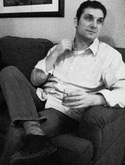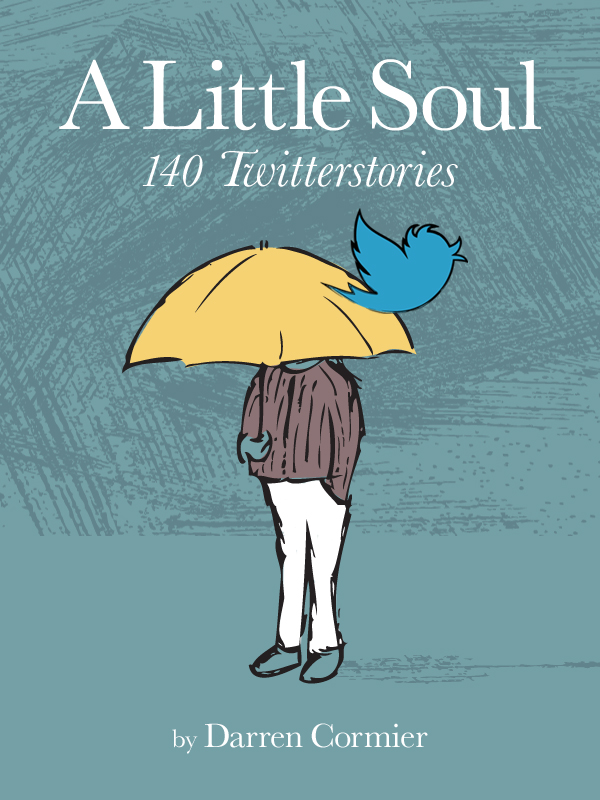 Anthony Trollope wrote seven pages a day, seven days a week. And would actually begin a new book if he came to the end of one before his day’s quota had been met. – David Markson, This is Not a Novel Mood affects everything we do, how we interact with other people, affects our productivity at work, affects how personal relationships, our energy levels. When we are in a sour mood (angry, sad, depressed, frustrated, etc.) our productivity at work suffers, we don't feel like working or interacting with other people, others' good moods will aggravate us, seeing tiny little moments of joy from others will annoy us and make us wish that person would leave. We probably don't want to create music, art, literature, cook, etc. Likewise when we are in a happy mood, when we are excited, content, we are more prone to creativity, our productivity increases, our interactions with others is more affable, tiny instances that will usually aggravate us (the copier being out of ribbon, the cat knocking over our glass of water, the next door neighbor mowing his lawn at 8p when we're trying to enjoy a book or our favorite TV show) we can shrug off. But how does mood affect writing, or any art for that matter, assuming of course that we have mustered up the courage to write in the first place, that we have been able to see past our elation and attention devouring ecstasy, past our lethargy and depression to focus on writing? One wonders if Anthony Trollope had this problem. As shown in the Markson quote above, Trollope clearly did not have a problem in garnering the motivation to write. However, what was his output like on those days he did not feel quite so creative, on those days he just didn't feel enthusiastic about the writing process, those days when he would have rather just stayed in bed with a bottle of wine and asked his servants to bring him a ham sandwich, he was not getting out of his sleeping gown? Was his output more dour, did he decide to work on stories or scenes that would reflect his mood? If he woke up in a foul mood one morning, but if in the novel he was working on at that moment he was presently working on a blissful wedding scene, would he have been able to push aside his own negativity and create the scene the novel demanded? Or did his mood alter the scene? Would he have to go back and revise what he had initially written as a crashed wedding, a blasphemous affair into something more mood appropriate? And vice versa. If one is in an elated mood, are they more capable of accessing the dark recesses of their mind, of their heart, if they are working on a murder scene or a scene of heartbreak, or emotional turmoil? Does the act of writing itself allow us to focus not on ourselves but on the work? Is the outlet enough to allow us to compartmentalize our private lives from our writing lives? Or does our personal mood affect the output of what we write? A writer friend wrote a while ago that when she is in the midst of writing an emotional scene in her book or her story that she can't help but become emotional as well, that what the characters are going through affect her. After completing the scene, she feels emotionally drained. And perhaps this is a symbiotic nature of the work itself. I haven't asked her, but I'm assuming she went into her writing that day knowing that the piece would be emotional, but that earlier she was probably in a good mood. As she began writing the events themselves began to affect her, her writing, the scene affecting her mood, her mood reflecting in her writing, scene and personal disposition mirroring each other, fiction reflecting life reflecting fiction reflecting life reflecting.... I cannot say this has happened before. In one of my stories (as yet unpublished) I wrote the scene of a young man watching the death of his mother, the two of them sharing a cigarette in the kitchen after she collapsed while they waited for the ambulance. At the risk of sounding immodest, it is a very powerful scene. However, when I was writing it, I only felt pleasure that I was able to capture an emotionally wrenching scene with such authenticity. The writing did not leave me emotional for my character; I did not feel saddened afterward, nor was my mood being reflected in the story itself. However, I did know the night before that I would need to be a bit more alert to write the scene. Once I arrived at the point of the mother's death flashback, it was 3am, and my eyes were sagging to the floor. I realized I would need to be of full alertness to properly convey the emotional intensity of the scene. But during the writing of it, I felt nothing but placidity, an unwavering equanimity. What my character was going through did not affect my mood. Or did it? Would I have been able to write so authentically as my character had I lost my job earlier in the day? Would I have been able to render the devastating power conveyed by the shared cigarette had I won the lottery earlier that afternoon? (Would I even have been writing if I had won the lottery earlier that afternoon?) It's possible that my mood of calmness was portrayed in the calm manner by which I wrote. We can never be sure. Eric Maisel wrote in his book Deep Writing about how to best access our deep feelings, how to allow ourselves to become free of our inhibitions and fears through writing about them, how writing can be a form of therapy. He wrote of how our own years-long issues can be a catalyst for our stories and be re-explored through story. At the beginning of the book he quoted a former patient who believed that a healthy sense of self and well-being was needed to create art: When I am completely healthy, completely healed, will there be more art in me? I think there will be and maybe it will be some of the best. That sense of wholeness and well-being must be a wonderful place to make art from. I hope I get a chance to be there, even if only for a while.
Many writers--at least those who have not had any form of success and keep their writing exclusively to the confines of their moleskine notebook or in reams of marked-up typewritten paper in a drawer, writing that has never seen another person's eyes except perhaps their bedraggled spouse's and even then perhaps not because the writer isn't confident enough to show it to them--have a certain nagging superstition, or a massive insecurity in their head. (Clearly, they have more than just this one forthcoming insecurity, or else they would feel free to show their work to even their spouse, but that's a different discussion and I've dragged on this topical sentence as long as I can. I have to get to the point eventually, or this threatens to become the Tristram Shandy of blog posts.)
That one superstition is that if they tell an idea to someone before they have a chance to finish it, that idea will either a) lose all potency and will not be pursued, or b) more nefariously, their idea will be stolen by someone else. Neither idea evokes much trust in humanity and the helping nature of people. These are clearly not the writers who would ever join a writer's group or even enroll in an MFA program. For that matter, they would never apply to an MFA program where their unfinished ideas have to be shared with others all the time.
I mention this because I feel I am about to violate this one major superstition. But since it is a belief I no longer have (I did at one point, years and years and years ago, in high school, and for a few brief insecure moments in undergrad where I probably trying to engender a mysterious and sensitive persona) I will share my ideas with the public, or the public I imagine that reads this blog. (all three of you.)
Some may remember that a few months back I experimented with the idea of writing an essay chronicling what goes through my head when I go running. The essay would be written in the latter-day David Markson style: pastiche, omnidirectional, collage-like, almost like an anti-novel told in Tweets or status updates, each anecdote no longer than a few lines, told in a hyperkinetic, scattershot style, much like how we imagine our brains work. The style of this essay would emulate how thoughts weave in and out of our heads when running, or even weave in and out of our thoughts when not running. I attempted a few entries like this, but each time I went running, I would think about remembering what I thought, and would attempt to recreate this when I returned home, my thoughts while running becoming meta-thoughts, the essay itself becoming meta-writing. But I lacked the discipline, and the idea of writing about running in this fashion, although the possibilities seemed infinite, ultimately proved narrow. The structure did not fit the idea.
About a month ago, I had an idea where this pastiche, Tweet-like approach could better be put to use. And yesterday, while at the Boston Book Festival, I attended a lecture titled The Novel: A Prognosis. The thesis of this panel and discussion was that the traditional novel as we know it is dead, and we live in an era where digital communication and digital media can no longer be ignored. Its effects have affected our way of thinking, our way of perception, our way of absorbing and interacting with people, places, and things. We have become the thing we did not want to become. And now we have to embrace it. And the novel, the essay, the written word has to embrace it. Nick Monfort, associate professor of digital media at MIT, said that we are not very far away from having the world's first Twitter book, a novel told entirely in tweets, 140 characters at a time. All the tweets could later be synthesized and re-jiggered into a book, but we are not that far from that time, and nor should we be.
Since I had this idea recently, I decided my idea was perfect for this challenge. And here it is. My new Markson-style, Tweetish essay on love. I am going to write an essay on the nature of love, omnidirectional, including quotes on all aspects of love, that indefinable emotion that we all have and yearn for and are embodied with and that we all find impossible to define: the nervous beginning moments, the growing comfort of, the ideas of soul mates, whether they exist, the myths, the facts, the origins, ideas taken from pop culture, songs, films, movies, heartbreak, love of humanity, forgiveness love, strength, courage it causes, infatuation, obsession, sexual, intimate, spiritual, familial, platonic, and everything else that is not covered in the above. All in 140 character spaces. It will posted both here and on my twitter page (@darrencormier), and reposted on Facebook, and any other social media outlets I may reach out to.
And there it is. My idea. Announcing to the world before I have a chance to tackle the idea. Thumbing my nose at the superstitions of other writers; thumbing my nose at the gods of insecurity. I am putting my idea into the digital maelstrom with the trust and indifference if it is stolen.
And so... there it is.
Love.
For a long time I have wanted to write an essay regarding what goes on through one's head while they are running. The structure of the essay would mirror the patterns of one's thoughts while running: in other words, the essay would be as scattered, fragmented, and stream-of-conscious as the thoughts that pass through one's head during a normal day. I have also for a while now wanted to write a long experimental essay that would take place over the course of time, in which individuals would be free to jump in at any point, an essay that would take into account the concept of time and participation, in which the ending was not written as people are reading it, as it is published. A serial experimental essay. I realized the running essay would be the perfect venue for this type of structure and real-time experiment. Given the recent passing of David Markson, and how his d istinctive latter-day style was equally fragmented, seemingly arbitrary, and random as the firing of synapses in our brains, it seems fitting that I start this now. This essay will be an ode to Markson and will include many of the thoughts that flow through my own head while running. It will be self-reflexive, random, arbitrary; it will include longer sections of research concerning the physiological changes that happens while we run, what chemicals our body releases and how it affects our muscles and our moods; it will contain many grammatical errors as I will be publishing it in real-time. (I will go back and edit each entry, and possibly rearrange the order of each section.) It will also make no sense to anyone who happens to read just one sentence every so often, which, I suppose, is also part of the intent. Overall, the intent of the essay is to show how running and writing are inter-related, to explore their reciprocal, symbiotic relationship: how the activities themselves resemble the stream-of-consciousness style, and how the two can best be described and experienced only during the actual doing of the activity. Both are performed, for the most part, in solitude. (Even with the inclusion of runner's groups or a running partner, or the invention of writers groups, running and writing are ultimately a solitary activities.) A writer is happiest when he is writing, not when the product is finished. A runner is happiest when he is running, not when he sees his time and distance after the run. Also, in an effort at maintaining another continuous project, I will attempt to include at least one new section per day, even if that section is one random sentence. This introduction does not count as a section of the essay. I hope you all enjoy this project. As always, any feedback is well-appreciated. Thank you.
David Markson passed away over the weekend. The official obituaries say that he passed away on June 6, but the articles also state that his children found him on June 4th. The exact date of when he actually passed is unknown, which seems strangely appropriate. The narrator of this fragmented novel states at one point: "Perhaps I am no more than 47 or 48," the narrator explains. "I am certain that I once attempted to keep a makeshift accounting, possibly of the months, but surely at least of the seasons. But I do not even remember any longer when it was that I understood I had already since lost track."David Foster Wallace wrote that Markson was direly underappreciated and wrote that Wittgenstein's Mistress was "quite possibly the high point of experimental literature in this country." I would go one step further and claim that Markson was perhaps the high point of experimental literature. Period. (For the record, I have not read Wittgenstein's Mistress, but I have read This Is Not a Novel and Reader's Block, and I can't imagine that Mistress eclipses those by a terribly large margin. It is the novel where he began what became his late career fragmentary, experimental style.) In 2007 he was honored by the American Academy of Arts and Letters. That same year New York Magazine called him "the best writer you never heard of."A year and a half ago I was attending a writer's conference in Chicago. One of the workshops on the agenda was a tribute to David Markson, which I had checked off on my giant conference booklet as one of the lectures I wanted to attend. I decided at the last minute not to attend as there were other more career-appropriate lectures for me at that point: how to go about applying for a grant, or how to write a query letter, or how to go about getting flash fiction pieces published. At that point I also had not completed This is Not a Novel and had not yet read Reader's Block. Had I known that the man who reinvented what was possible with a novel would pass away less than two years later I most certainly would have said, "Career be damned! This is David Markson." I have very few regrets in my life, but I can add my skipping of that lecture to that short list. My remembrance of Markson's life as a writer and his work cannot match one of the tributes I read to him earlier today. As such, I will let journalist Sarah Weinman's much more eloquent words speak for me: "Others will chime in with more reasoned and coherent essays on what Markson meant for American literature, and I'll link to those as I do to other missives below once they come in. But I got to know the writer's work, and later on, a little bit, the man, through his earliest output, a couple of entertaining and erudite crime novels featuring a scamp of a private detective named Harry Fannin. I'd read THIS IS NOT A NOVEL and had been excited and blown away, and just weeks later I was assigned to write my very first piece for the Los Angeles Times - a double review of those two Fannin novels, EPITAPH FOR A TRAMP and EPITAPH FOR A DEAD BEAT..."After that review he got in touch with me - oddly enough by email, through a friend, since he did not own a computer - and we corresponded a little, by postcard and letter. I'd see him at the Strand Bookstore sometimes, one of his regular haunts, shooting the shit with the cavalcade of managers working the review copy desk in the basement..."I saw Markson last at the public memorial for David Foster Wallace. I hadn't seen him around for several months and asked after him and his health. But the answer, at least to me, was obvious. He was more frail. He didn't have to articulate his sadness over Wallace's suicide, that a much-younger man with prodigious talent had died too soon, and that it was a far different feeling from watching friends your own age pass on. A thought passed through my head that Markson might not be around much longer and I should get back in touch, lest the inevitable catch me off-guard. Like many good intentions, it wasn't acted upon."
|


 RSS Feed
RSS Feed

